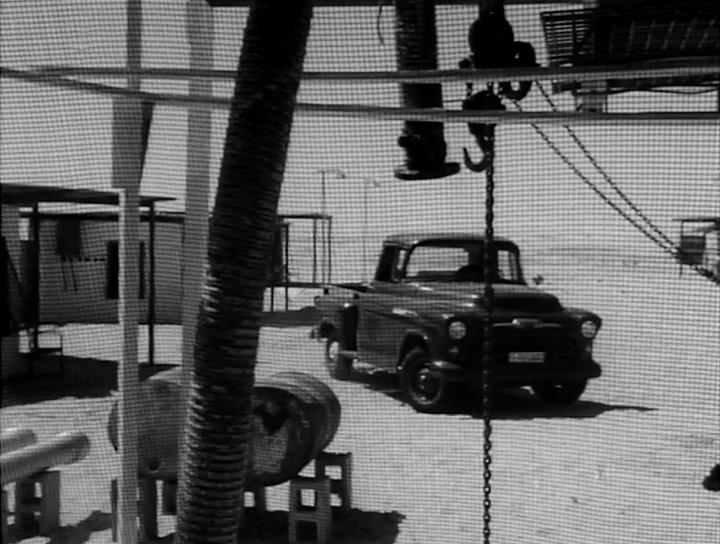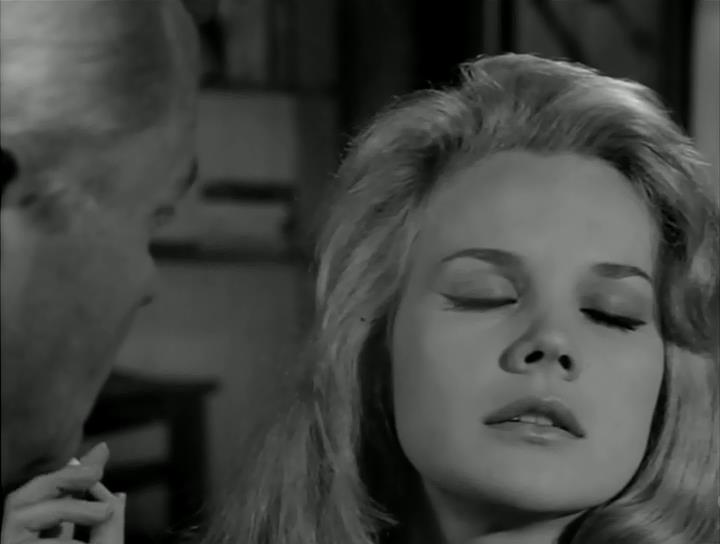Nowhere
to Go
The late Canadian
coin collector leaves a relict who is swindled out of them in England, and that
most amusingly, by a fellow Canadian who goes to prison as part of his plan,
blasts out with a confederate’s help, comes to grief and dies in a stolen
lorry on a farm in Wales.
Holt’s idea
of a joke, for Balcon and Ealing and as funny as they come, but played as
straight drama from first to last.
A slightly longer
version exists and is much to be preferred at ninety-nine minutes, less
cramped.
Peppard’s Five Days from Home takes the note from
Holt’s captives, one of many anticipations,
Peckinpah for example.
A
beautifully-gauged masterpiece on crime
does not pay (cf. Losey’s The Criminal), indeed, the poor grifter’s
end is so abominable one might feel a sort of pity for him, in the classical
sense (the girl walks off toward light and work).
Perry (Forever Ealing) gives the game away,
“it does point the way cinema will go long after Ealing is dead and
buried,” he understands the ending as “pessimistic”.
Halliwell
concurs, “glum... fails to sustain
interest”.
Philip
French of The Observer, “not
exactly a masterpiece.”
Alexander
Mackendrick’s The Ladykillers,
of course, is at the back of all this.
The
Key
Danger Man
“A
dirty job” for the U.S. Ambassador in Vienna, from The Big Lift (dir. George Seaton) and, because it’s Harry and
his Maria, The Third Man (dir. Carol
Reed).
The material lays
a basis for Danger Route.
Taste of Fear
Cannes, the
disused summer house and pool, the master’s body.
“There’s
nothing more for you here,” a thoroughgoing Freudian examination goes
absolutely nowhere.
Madam and the
doctor and the chauffeur and the stepdaughter on a grand estate, not what it
was, Preminger’s Bonjour Tristesse, Clouzot’s
Les Diaboliques by reflection.
The originality
and beauty of the filming are a constant resource applied to the actors (Todd,
Lee, Lewis, Strasberg), the doctor’s French
inflections are amazingly accurate, for example.
Station Six Sahara

The
isolation of the surroundings.
The artistry and
diligence of the work, sustained over a hundred miles of oil pipeline.
Letters
from home, a single one worth a month’s pay.
Poker,
“house rules”, bluffs and pots.
Into these stakes
unconsciously floats the kind of woman only money can buy.
Andrew Sarris (The American Cinema), “his virtues
are things of bits and pieces.”
Medina Oil Co., a
five-year stint (cf. Lumet’s The Hill, with Bannen again).
The
need for a survey. Reasons for existence, possibilities of escape. Losey’s
Accident follows in due course.
Howard
Thompson of the New York Times, “not
especially good.” Variety, “a sex
melodrama”. Karl Williams (Rovi),
“potboiler”. Time Out,
“the underrated Holt directs with a tight grip.” Halliwell’s Film Guide, “the
courage of its lack of convictions.”

The Nanny
The British madonna
and child, achieved after some considerable effort in Regent’s Park with
a doctor upstairs and his teenaged daughter, a maiden aunt not too far away
(she has a heart condition), a Joseph on a mission to Beirut (the Queen’s
Messenger) and a Mary kept from it by the old nanny.
Jesus is thought
to have drowned his little sister in the bathtub, he’s institutionalized.
The nanny sees her long-lost daughter die at twenty-five of a slum abortion.
The performances
(James Villiers and Wendy Craig, Jill Bennett, the children, Bette Davis) are
absolutely comme il faut as a matter
of course, Holt goes farther to record every nuance, the slightest inflection.
He plays it so
faultlessly that critics came away thinking only that they had missed
something.
Danger Route
The
modern-day Jonah, a cog in the organization.
Huston (The Mackintosh Man) and Peckinpah (The Killer Elite) follow the affair.
Howard Thompson (New York Times),
“packs considerable punch.”
Variety,
“overly confused in unfoldment... too vague...
plot and counterplot...”
Geoff Andrew (Time Out), “confused and
fragmented,” he shares Sarris’ “promising” view (“Holt has at least one great picture in him, but
where is it and what would it be about?”).
Halliwell’s Film Guide, “little to commend it.”
One doesn’t
want to be a sheep, one wants the money, does as one
is told, has frayed nerves.
A bold enemy plot
to have the British assassinate an important defector en route to America, this is a job for the CIA. Our man is an
eliminator, goes where he’s sent, has a bint and a girl and a broad and a
dame to contend with, bosses, colleagues, a weak link, moon phases, the Cold
War.
Blood from the Mummy’s Tomb
Stoker’s
Septentrion makes a bloody good Mummy film, a good Freudian dream and a good
critique of the bella donna as a business item in one of those gross
cartels that see all, know all, and take all.
Tera of the
deathless sleep is Queen of the Darkness, right hand missing with its ruby
ring, lopped off by priests, her wrist bleeds down the centuries. The three
stages of her soul have talismans, a hooded asp, a jackal’s skull, a cat
idol.
Margaret has a
dream of all this, her father’s an Egyptologist.
One might, says a
colleague of his, read the Scroll of Life over Tera, reincarnated as Margaret,
avenge her upon the priests of Ancient Egypt, and rule all the world with the
mysteries of life and death.
When all is said
and done, one is a young Englishwoman bandaged from head to foot after the
house of cards has collapsed.